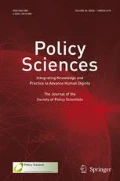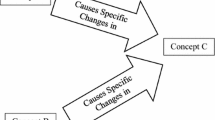Abstract
The term “policy sciences” refers both to a distinctive tradition within the policy movement and to the broader policy movement itself. While the generic use of this term is sure to persist, the community of policy scientists trained in the tradition founded by Harold Lasswell and Myres S. McDougal faces challenges to its sustainability as a distinctive tradition of the policy movement. To motivate open discussion and debate, this essay follows the logic of a problem-oriented analysis, and also includes personal reflections and anecdote, with the following objectives: It suggests that the policy sciences tradition faces challenges to its sustainability because of the simple arithmetic of generational turnover in university faculty. It explores six factors internal and external to the policy sciences community militating against sustainability. The essay then critiques three different roles the policy scientist might play in contemporary academia, and concludes with a discussion of alternatives that might enhance the sustainability of the policy sciences tradition, should sustainability indeed be a desired outcome.
Similar content being viewed by others
References
Almond, G. (1990). A Discipline Divided: Schools and Sects in Political Science. Newbury Park, CA: Sage Publications.
Ascher, W. and R. D. Brunner (1995). ‘Society for the Policy Sciences,’ published online at http://www.colorado.edu/UCB/TheUniversity/Committees/SPS/F/.
Ascher, W. and B. Hirschfelder-Ascher (2004). ‘Linking Lasswell's political psychology and the policy sciences,’ Policy Sciences 37: 23–36.
Ayala, F. J. (1996). ‘The candle and the darkness,’ Science 273: 442.
Brady, D. W. (1993). ‘The causes and consequences of divided government: Toward a new theory of American politics?,’ American Political Science Review 87: 189–194.
Brunner, R. D. (1991). ‘The policy movement as a policy problem,’ Policy Sciences 24: 65–98.
Brunner, R. D. (1996). ‘A milestone in the policy sciences,’ Policy Sciences 29: 45–68.
Brunner, R. D. (1997). ‘Teaching the policy sciences: Reflections on a graduate seminar,’ Policy Sciences 30: 217–231.
Clark, T. W. (2002). The Policy Process: A Practical Guide for Natural Resource Professionals. New Haven, CT: Yale University Press.
Cohen, I. B. (1994). Interactions: Some Contacts Between the Natural Sciences and the Social Sciences. Cambridge, MA: The MIT Press.
Daniels, G. H. (1967). ‘The pure-science ideal and democratic culture,’ Science 156: 1699–1705.
deLeon, P. and K. Kaufmanis (2001). ‘Public policy theory: Will it play in Peoria?,’ Policy Currents 10(4): 9.
deLeon, P. and T. Steelman (1999). ‘Making public policy programs effective and relevant: The role of the policy sciences,’ Journal of Public Policy Analysis and Management 20: 163–171.
Falk, R. A. (1995). ‘Casting the spell: The New Haven School of international law,’ Yale Law Journal 104: 1991–2008.
Fischer, F. (1998). ‘Beyond empiricism: Policy inquiry in post-positivist perspective,’ Policy Studies Journal 26: 129–146.
Fischer, F. (2003). Reframing Public Policy. Oxford, UK: Oxford University Press.
Flyvbjerg, B. (2001). Making Social Science Matter: Why Social Inquiry Fails and How It Can Succeed Again. Cambridge, UK: Cambridge University Press.
Hill, K. Q. (1997). ‘In search of policy theory,’ Policy Currents 7(1): 1–9.
Ingram, H. and S. R. Smith (1998). ‘Institutions and policies for democracy: A discussion paper and comments,’ Policy Currents 8(1): 1–13.
James, W. ([1907] 1963). Pragmatism and Other Essays. New York: Washington Square Press.
Karl, B. D. (1974). Charles E. Merriam and the Study of Politics. Chicago: University of Chicago Press.
Lasswell, H. D. (1956). The Decision Process: Seven Categories of Functional Analysis. College Park: Bureau of Governmental Research, College of Business and Public Administration, University of Maryland.
Lasswell, H. D. (1971). A Pre-View of Policy Sciences. New York: American Elsevier.
Lasswell, H. D. and A. Kaplan (1950). Power and Society: A Framework for Political Inquiry. New Haven, CT: Yale University Press.
Lasswell, H. D. and M. S. McDougal (1992). Jurisprudence for a Free Society: Studies in Law, Science and Policy, 2 Vols. New Haven, CT: New Haven Press; Dordrecht: Martinus Nijhoff.
Lerner, D. and H. D. Lasswell, eds. (1951). The Policy Sciences: Recent Developments in Scope and Method. Standford, CA: Stanford University Press.
MacEachren, A. M. (1995). How Maps Work: Representation, Visualization, and Design. New York: Guilford Press.
McDougal, M. S. (1979). ‘Harold Dwight Lasswell, 1902–1978,’ Yale Law Journal 88: 675–679.
Ostrom, E. (1999). ‘Institutional rational choice: An assessment of the institutional analysis and development,’ in Paul Sabatier, ed., Theories of the Policy Process. Boulder, CO: Westview Press, pp. 35–71.
Pielke, R. A. (2002). ‘Policy, politics, and perspective,’ Nature 416: 368.
Ross, D. (1991). The Origins of American Social Science. Cambridge, UK: Cambridge University Press.
Sabatier, P. A. (1991). ‘Political science and public policy,’ Political Science and Politics 24: 144–147.
Sabatier, P. A., ed. (1999). Theories of the Policy Process. Boulder, CO: Westview Press.
Sarewitz, D. and R. A. Pielke, Jr. (1999). ‘Prediction in science and policy,’ Technology in Society 21: 121–133.
Sarewitz, D., R. A. Pielke, Jr. and R. Byerly (2000). Prediction: Science, Decision Making, and the Future of Nature. Washington, DC: Island Press.
Schlager, E. (1999). ‘A comparison of frameworks, theories, and models of policy processes,’ in Paul Sabatier, ed., Theories of the Policy Process. Boulder, CO: Westview Press, pp. 233–260.
Schön, D. A. and M. Rein (1994). Frame Reflection. New York: Basic Books.
Science (1883). ‘The Future of American Science,’ Science 1(1): 1–3.
Scott, J. C. (1998). Seeing Like a State: How Certain Schemes to Improve the Human Condition Have Failed. New Haven, CT: Yale University Press.
Seidelman, R. and E. J. Harpham (1985). Disenchanted Realists: Political Science and the American Crisis, 1884–1984. Albany: State University of New York Press.
Stokes, D. (1998). Pasteur's Quadrant. Washington, DC: The Brookings Institution.
University of Maryland, Baltimore County (2002). ‘Policy Sciences Graduate Program,’ May 24, http://www.umbc.edu/posi/index.html.
Wallace, R. (2003). ‘Review of The Policy Process, by Tim W. Clark, and The Foundations of Natural Resource Policy and Management, eds. Tim W. Clark, Andrew R. Willard, and Christina M. Cromley,’ Policy Sciences 36: 343–348.
Weinberg, A. M. (1970). ‘The axiology of science: The urgent question of scientific priorities has helped to promote a growing concern with value in science,’ American Scientist 58: 612–617.
Weinberg, A. M. (1992). Nuclear Reactions: Science and Trans-science. New York: American Institute of Physics.
Author information
Authors and Affiliations
Corresponding author
Rights and permissions
About this article
Cite this article
Pielke, R.A. What future for the policy sciences?. Policy Sci 37, 209–225 (2004). https://doi.org/10.1007/s11077-005-6181-x
Published:
Issue Date:
DOI: https://doi.org/10.1007/s11077-005-6181-x




